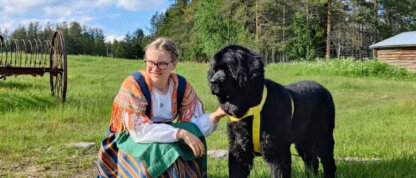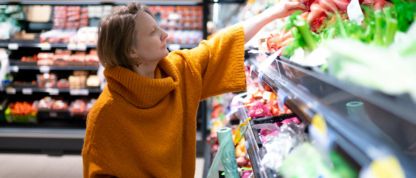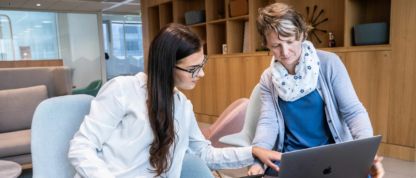
This is Inka, our Impact Assessment Specialist

The next in line for introduction is our Impact Assessment Specialist Inka-Mari Sarvola.
Inka holds a Master’s Degree in Agriculture and Forestry. She has specialised in environmental and natural resource economics, more precisely in dynamic optimisation in the field of ecological-economic models of forestry and reindeer husbandry. She started her career at Biocode as a trainee, when she learned a lot about impact assessments. Since then, Inka really stepped out as a talented Impact Assessment Specialist who’s work day consists of various tasks from LCA modelling to customer projects and development of Biocode’s carbon footprint calculator.
Driven by ecological values
Nature and the environment are close to Inka’s heart. She has always lived close to nature which makes fighting for environmental improvements almost like fighting for her living habitat. Nature conservation and being environmentally friendly have also been core values in her family.
Inka takes part in climate actions by riding a bicycle as much as she can to move around in Helsinki instead if driving a car or taking a bus. She recycles eagerly and avoids food waste and only buys meat products that are about to become food waste. Inka thinks buying discount food is not only budget friendly and reduces food waste, but is also fun: you never know, what new products you can find and try!
Versatile work tasks in the field of sustainable development
Inka was a trainee at Biocode during her studies. As a trainee she figured out emissions factors from literature and different databases, updated emissions calculations to meet the newest IPCC guidelines and modelled life cycles for multiple products. Inka thinks that the fun part in carbon footprint calculations is that they are simple, but they require multiple details. Inka continues her work with impact assessments as Specialist because the work has a good balance of modelling and calculations, literature review and programming.
“It has been interesting to see how interdisciplinary the work of impact assessment specialists and programmers is and how closely they work together. Despite their different fields of expertise, they both require quite a lot of knowledge on the area of the other. I think that commercial climate work should be transparent, simple to use and based in science, exactly as Biocode’s work is.”
Inka-Mari Sarvola
Inka’s recommendations for those who’re interested in LCA
Inka tells that during her studies, it was eye-opening to visit Finnish farms in tours organised by agricultural students of University of Helsinki, and also visiting her friends’ farms. She recommends everyone to get to know where the food comes to grocery stores and how it is produced. This knowledge helps a lot when formulating impact assessments of primary production. Visiting farms on their “open house” days is a great way to see the farm infrastructure and maybe even meet the animals.
Inka would like to encourage all companies to take trainees. Trainees are often motivated to apply their studies in work life. Work experience is important, especially for trainees coming from academia. For the company, trainees offer precious help, diverge substance knowledge and a great chance to test how well the work is organised. Working might also help trainees to learn about methods they haven’t yet encountered at any lectures.
“I didn’t have experience in LCA before this traineeship, but I had my knowledge of modelling and agriculture to offer. I have brought valuable insights to Biocode, and I have learned about LCA in return.”
Inka-Mari Sarvola
At Biocode, we are a team of multidisciplinary experts – bound and determined to improve the planetary conditions for life. Get to know our mission and meet the team!
Stay tuned and subscribe to our messages about the climate, food industry and food supply chain


